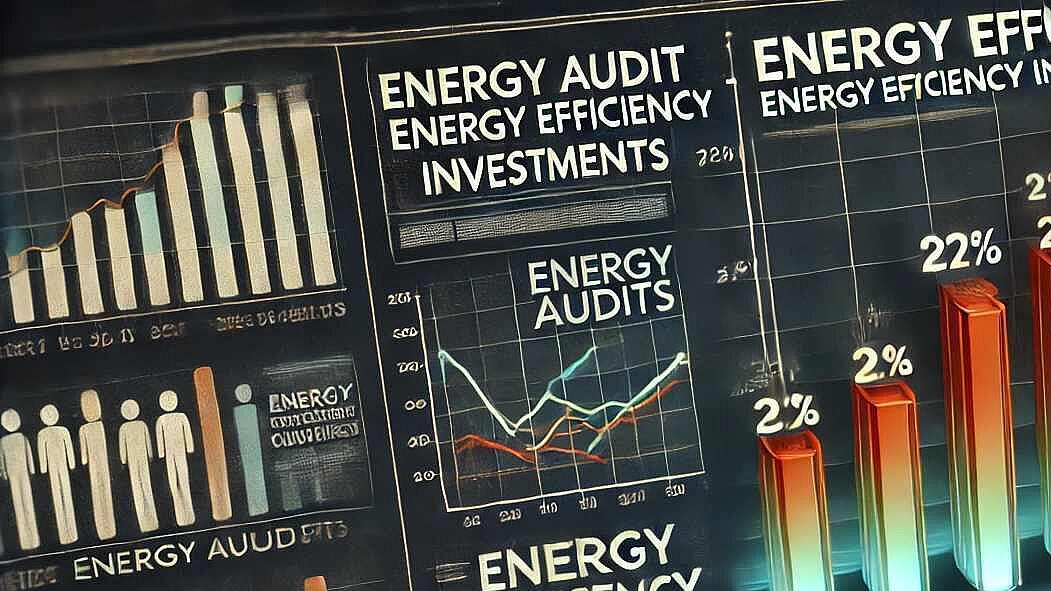 Energy Efficiency
Energy EfficiencyGame Changer: How Energy Audits are Transforming Small Businesses
Summary
Energy audits are becoming crucial for SMEs in managing energy consumption and cutting costs. These assessments detail a company's energy use, identifying efficiency improvements and savings opportunities, particularly valuable for SMEs with less resources than larger corporations. The European Investment Bank's data indicates that firms that have undergone an energy audit are 1.5 times more likely to invest in energy efficiency, with manufacturing and services sectors showing nearly double the likelihood. Smaller firms benefit disproportionately from energy audits as these audits impact their decision-making and investments significantly due to their higher relative energy costs and limited in-house energy management expertise.
SMEs tend to adopt energy-efficient measures in support processes more than in production processes due to lower capital requirements and quicker returns. Additionally, innovative firms are more likely to implement recommendations from energy audits, improving their buildings and machinery quality standards. However, financial constraints can hinder the implementation despite the identified savings opportunities. Therefore, the availability of targeted financial resources for energy-efficiency investments is essential.
In conclusion, energy audits are an essential step towards an energy-efficient business model for SMEs, enabling informed investment decisions, reducing costs, and contributing to sustainability, thereby shaping a more energy-efficient economy.
Open full article
Game Changer: How Energy Audits are Transforming Small Businesses
In an era of rising energy costs and increasing environmental concerns, small and medium-sized enterprises (SMEs) are discovering a powerful tool to boost their bottom line and reduce their carbon footprint: energy audits. These comprehensive assessments of energy use and efficiency are proving to be game-changers for businesses across Europe, helping them identify cost-saving opportunities and paving the way for smart investments in energy-efficient technologies. Let's explore how energy audits are revolutionizing the way SMEs approach energy management and why they're becoming an essential part of business strategy.
The Power of Information - Understanding Energy Audits
Energy audits serve as a roadmap for businesses, providing detailed insights into their energy consumption patterns and identifying areas where efficiency can be improved. By analyzing everything from lighting systems to production equipment, these audits offer a comprehensive view of a company's energy profile, highlighting opportunities for savings that might otherwise go unnoticed.
For SMEs, which often lack the resources of larger corporations, this information is particularly valuable. It allows them to make informed decisions about energy-saving investments, prioritizing those with the highest return on investment. Moreover, energy audits help overcome one of the biggest barriers to energy efficiency: lack of information.
The Numbers Don't Lie - The Impact of Energy Audits on SME Investments
Recent studies have shown that energy audits have a significant positive impact on SMEs' decisions to invest in energy-efficient measures. According to data from the European Investment Bank Surveys, firms that have undergone an energy audit are 1.5 times more likely to invest in energy efficiency improvements compared to those that haven't.
This increased likelihood of investment is particularly pronounced in certain sectors. Manufacturing and services businesses, for instance, are almost twice as likely to invest in energy-efficient measures after an energy audit. This suggests that these sectors may have more to gain from energy efficiency improvements, possibly due to their higher energy consumption or the nature of their operations.
Size Matters - The Disproportionate Benefit for Smaller Firms
One of the most intriguing findings from recent research is that energy audits appear to be particularly beneficial for smaller firms. While businesses of all sizes can benefit from energy audits, the impact on decision-making and subsequent investments is more pronounced for smaller SMEs.
This could be due to several factors. Smaller businesses often have less in-house expertise when it comes to energy management, making the insights provided by an audit particularly valuable. Additionally, the relative impact of energy costs on overall expenses may be higher for smaller firms, making efficiency improvements more critical to their bottom line.
Beyond the Obvious - Support Processes vs. Production Processes
When it comes to implementing energy-efficient measures, not all processes are created equal. Research indicates that SMEs are more likely to implement energy-efficient measures in support processes (like lighting and heating) than in production processes (like machinery upgrades).
This difference could be due to several factors. Support process improvements often require less capital investment and cause less disruption to business operations. They may also offer quicker returns on investment. However, it's important to note that while support process improvements are valuable, production process improvements often offer greater long-term energy savings potential.
The Innovation Connection - How Forward-Thinking Firms Benefit Most
Innovative firms appear to reap the greatest benefits from energy audits. These companies are twice as likely to invest in energy-efficiency improvements following an audit compared to their less innovative counterparts. This increased propensity to invest translates into tangible improvements, with innovative firms showing higher quality standards in their buildings and machinery post-audit.
This connection between innovation and energy efficiency makes sense. Innovative companies are often more open to new ideas and technologies, making them more likely to embrace the recommendations that come out of an energy audit. They may also be more adept at integrating energy efficiency improvements into their overall business strategy.
The Financial Factor - Overcoming Barriers to Implementation
While energy audits clearly demonstrate their value in identifying opportunities for energy savings, financial constraints can still pose a significant barrier to implementation. The research shows that the positive impact of energy audits on energy-efficiency investments diminishes when firms are finance-constrained.
This highlights the importance of not just identifying energy-saving opportunities, but also ensuring that businesses have access to the financial resources needed to implement them. Policy makers and financial institutions have a role to play in bridging this gap, potentially through targeted financing programs for energy-efficiency investments.
Conclusion: The Future is Efficient
As we look to the future, it's clear that energy efficiency will play an increasingly important role in business success. Energy audits are proving to be a powerful tool in this journey, helping SMEs identify opportunities, make informed decisions, and invest wisely in energy-saving measures.
For small and medium-sized businesses looking to reduce costs, improve competitiveness, and contribute to a more sustainable future, energy audits offer a clear path forward. By providing the information and insights needed to make smart energy decisions, these audits are not just transforming individual businesses - they're helping to shape a more energy-efficient economy for us all.
If you want to know more, read the full report here.
This is article and the underlying reports provides the answers to the quiz from EnerWhizz
- 5 questions in 45 seconds
- country league system
- Start as an Amateur and become a Pro!



